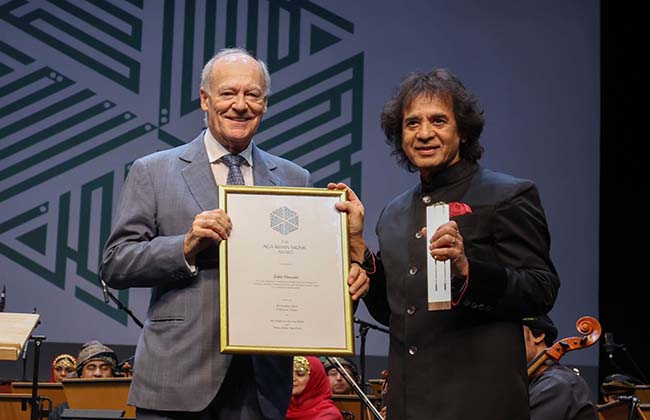
Acclaimed Indian tabla player Ustad Zakir Hussain has received prestigious Aga Khan Music Award in lifetime achievement category for his enduring contributions to the musical heritage of humanity at a ceremony at Muscat in Oman.
Prince Amyn Aga Khan on Saturday night presented the special award to Zakir Hussain as he said the true impact of the Aga Khan Music Awards will be measured by the achievements of a laureate like Zakir Hussain.
The award was given for his peerless musical mastery and sustained social impact as a performer and teacher, according to the award citation.
The Prince said such a maestro endeavours to use his musical talent and knowledge to contribute to the well-being of the respective societies and of humanity at large.
“The gift of artistic talent bestows a responsibility on those who receive it to share their good fortune with others, to unite us despite our many apparent differences,” he said.
Prince Amyn underscored the important role of the Music Awards in supporting music educators.
“By educating young people in their own musical traditions while also providing them the tools to expand those traditions in new cosmopolitan directions, we are helping to prepare a new generation of cultural leaders that will build bridges and connections across cultures,” he said.
Prince Amyn’s address was preceded by remarks from Dr Jamal al-Moosawi, Director of the National Museum – Sultanate of Oman.
Dr al-Moosawi noted that hosting the second edition of the Aga Khan Music Awards is very much in alignment with the Sultanate’s desire to build bridges of communication and cooperation between countries and cultures.
The Royal Oman Symphony Orchestra was joined by the Aga Khan Master Musicians (AKMM), the resident ensemble of the Aga Khan Music Programme, in a rousing performance of “Tashkent,” composed by AKMM saxophonist Basel Rajoub and arranged for orchestra by Dmitri Yanov-Yanovsky.
Ustad Zakir Hussain, meanwhile, with hismesmerisingperformance enthralled the audiencein the Royal Opera House Muscat’s House of Musical Artson Saturday night.
He performed as a soloist with the Royal Oman Symphony Orchestra under the baton of Maestro Hamdan al Shaely in a performance of Peshkar, a concerto for tabla and orchestra composed by Zakir Hussain in 2015.
In addition to Ustad Zakir Hussain, other laureates who performed live or were presented in short films include sarangi players Dilshad Khan and Asin Khan Langa, from India; Tanzanian praise singer Yahya Hussein Abdallah; Coumbane bint Ely Warakane, a hereditary griot from Mauritania; singer and guitar player Afel Bocoum, from Mali; devotional singer Sain Zahoor and “Queen of Pashtun Folk Music” Zarsanga, from Pakistan; and music researcher Musallam Al-Kathiri, from the Sultanate of Oman.
The Music Awards will continue for the second day on Sunday with more performances, films and presentations of awards.
The triennial Awards, established by the Aga Khan in 2018, recognise exceptional creativity, promise and enterprise in music in societies across the world in which Muslims have a significant presence.
Award winners and recipients of a Special Mention will share a prize fund of $500,000 as well as opportunities for professional development.
List of the laureates of the 2022 Aga Khan Music Awards:
Afel Bocoum (Mali)
Singer and guitar player from Niafunke, Mali whose music combines acoustic guitar with local instruments to echo the sound of “desert blues” in an earthier, tradition-based style.
Asin Khan Langa (India)
Sarangi player, singer, composer and community activist from Rajasthan’s hereditary Langa musical community, who performs Sufi poetry set to traditional and newly composed melodies.
Coumbane Mint Ely Warakane (Mauritania)
Singer and ardin (harp) player from Trarza, in southwest Mauritania, who performs the music of Mauritanian griots in a deeply traditional style.
Daud Khan Sadozai (Afghanistan)
Leading exponent of the Afghan rubab who has had a major impact on the preservation, development and dissemination of Afghan music worldwide.
Peni Candra Rini (Indonesia)
Indonesian composer, improviser, vocalist and educator whose knowledge of traditional Indonesian performing arts informs her creation of new works produced worldwide.
Soumik Datta (UK)
Sarod player who fuses his training in Hindustani classical music with pop, rock, electronica and film soundtracks to raise awareness about urgent social issues including climate change, refugees and mental health.
Yahya Hussein Abdallah (Tanzania)
Singer and composer of devotional songs and reciter of the Qur’an from Dar es Salaam, Tanzania who composes and sings in Swahili as well as some of Tanzania’s 126 local languages.
Yasamin Shahhosseini (Iran)
Leading young master of the oud who is reimagining the place of this instrument in Iranian music through her innovative compositions and improvisations.
Zarsanga (Pakistan)
Singer from Khyber Pakhtunkhwa, Pakistan, known as the Queen of Pashtun Folklore for her career-long devotion to the orally transmitted traditional music of tribal Pashtuns.
Special Mentions
Dilshad Khan (India)
Tenth-generation sarangi player from a hereditary lineage in Rajasthan who is expanding the language of the sarangi in film music and through innovative cross-cultural collaborative projects.
Golshan Ensemble (Iran)
Four women who perform Iranian traditional music with a contemporary sound and are active as teachers, with a special focus on transmitting their musical tradition to girls and women.
Sain Zahoor (Pakistan)
Punjabi musician with a lifelong practice of singing Sufi poetry in local shrines and festivals, often accompanied by ecstatic dance.
Seyyed Mohammad Musavi and Mahoor Institute (Iran)
Founder and long-time director of Mahoor Institute of Culture and Arts, who has made seminal contributions to the development of Iranian music and musicology.
Zulkifli and Bur’am (Aceh, Indonesia)
Revitalisers of Acehnese song traditions who have cultivated community building amongst youth through their participation in Bur’am, a traditional singing and drumming ensemble established by Zulkifli.


